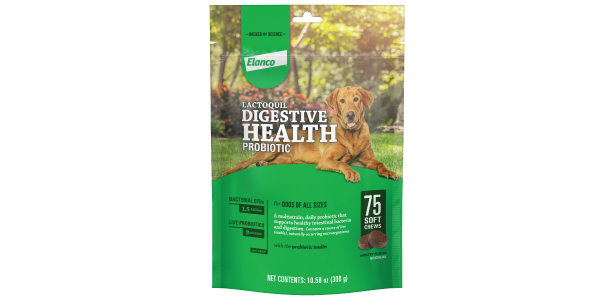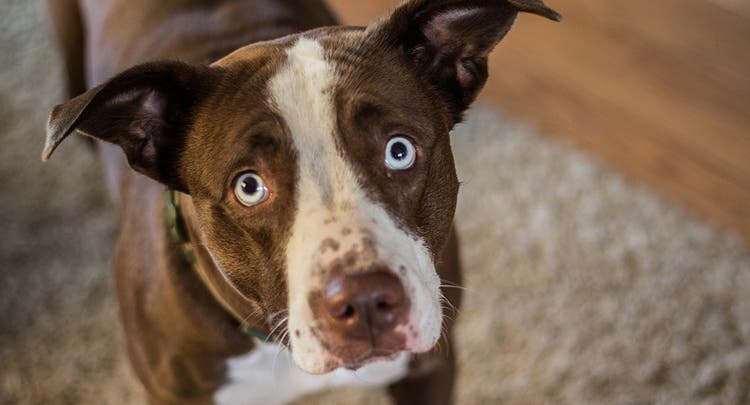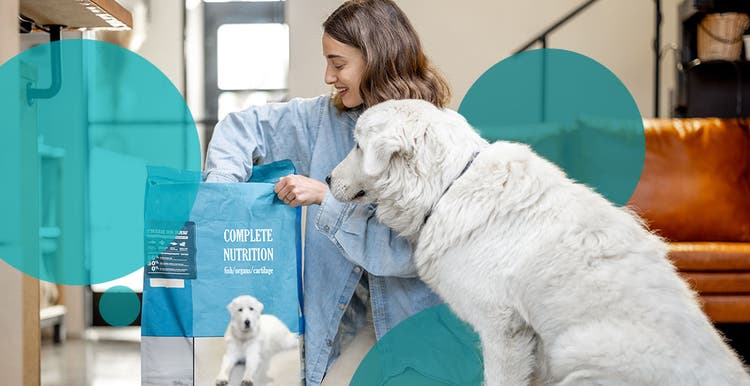What are the signs your dog may need probiotics? Learn how theses supplements can help support your dog’s digestive system.
Most of us have heard about probiotics and the potential benefits they can provide for our digestive systems. Every time you take a probiotic supplement, you’re supporting the good bacteria in your GI tract and boosting your immune system.
But could probiotics also benefit your dog? The short answer is yes — probiotics can help support your dog’s overall digestive health, as well as help improve health conditions like diarrhea, gastrointestinal distress, anxiety and more.
Benefits of Probiotics for Dogs
Probiotics can help keep the bacteria in your dog’s gut balanced, support the protective layers of the intestines and assist with normal digestion and nutrient absorption.
Probiotics aren’t a cure-all for digestive issues, but they have been shown to provide a wide variety of benefits, including:
- Helping with digesting food1 by boosting “good” bacteria in the gut2 and improving absorption of nutrients like calcium, iron and magnesium3
- Alleviating gastrointestinal issues like diarrhea,1,4 irritable bowel,1 leaky gut,3 intestinal inflammation1 and excess gas4
- Making short-chain fatty acids in the intestine, which can increase “good” bacteria and reduce “bad” bacteria1
- Decreasing anxiety and improving your dog’s mood1,3
When Should You Give Your Dog Probiotics?
Dogs can take probiotics on a regular basis to promote everyday digestive health and well-being. A daily probiotic like Lactoquil® Digestive Health Probiotic can help promote a healthy microbial balance in your dog, with just one or two tasty poultry-flavored chews each day.
However, there are several situations that may disrupt the healthy bacteria and microbiome in your dog. These circumstances include:
- Stress (from travel, going to the groomer or vet, moving or other life changes, etc.)
- Deworming
- Taking antibiotics
- Eating from the garbage can
- Getting older
- Dietary changes or food allergies
Additionally, your dog may be experiencing a specific health concern that might be improved with probiotics. Ask your vet about whether probiotics are a good option for:
- Diarrhea, intestinal inflammation or irritable bowel syndrome
- Food allergies
- Obesity
- Skin issues, including a dull coat
- Bad breath
- Urinary tract infections
- Anxiety3
How to Choose the Best Probiotics for Your Dog
Shopping for a probiotic for your dog doesn’t have to be overwhelming. Consult your veterinarian about probiotic supplements specifically formulated for dogs, and keep these factors in mind as you compare products:
- Quality: The supplement you choose should be labeled with the NASC Quality Seal, which identifies products from companies committed to quality, vigilance and continuous improvement.
- Form: Probiotics for dogs are available in a variety of forms, including soft chews, oral gels, pastes and powders. They can be given as a treat or mixed in food.
- CFUs: The amount of colony forming units (CFUs) can affect a probiotic’s efficacy. CFUs measure how many bacterial cells are in a probiotic supplement, usually a number in the millions or billions.
- Bacterial strains: Different brands of probiotics contain different strains of bacteria, which may be more or less effective for specific health issues. Read the product description of any probiotic you’re considering, and ask your vet for their recommendation.
Below, you’ll find a list of common probiotic strains organized by specific health conditions they may address. Look for these strains when comparing the ingredients lists of probiotic products for your dog.
Probiotics for Dogs with Diarrhea or Digestive Issues
- Bifidobacterium animalis2,3
- Bifidobacterium longum2
- Enterococcus faecium3
- Lactobacillus acidophilus2,3
- Lactobacillus plantarum3
- Lactobacillus reuteri3
- Lactobacillus rhamnosus3
- Saccharomyces boulardii3
Probiotics for Dogs with Allergies
- Bifidobacterium longum (for food allergies)3
- Pediococcus acidilactici (for skin conditions)3
Probiotics for Dogs with Anxiety or Increased Stress
- Bifidobacterium longum3
- Lactobacillus casei3
Endurosyn® Digestive Health Probiotic for Dogs is a three-day probiotic gel that can be given to promote intestinal well-being during times of sudden stress, such as travel, boarding, training, moving to a new home or taking antibiotics. It can also help reduce digestive upset and can benefit dogs with food sensitivities. Endurosyn® includes several strains of bacteria, including Lactobacillus acidophilus, Enterococcus faecium, Lactobacillus plantarum and Lactobacillus casei.
What Are the Possible Side Effects of Probiotics for Dogs?
While probiotics are a common supplement pet owners give their dogs, there may be potential yet rare side effects, including vomiting and diarrhea. To avoid these side effects, talk with your vet about how to best introduce probiotics to your dog. Consider starting out slowly with a lower dosage, but always make sure to carefully read the label.
What About Prebiotics for Dogs?
It’s not a typo — there is a difference between probiotics and prebiotics. So, what’s the difference?
- Probiotics typically include multiple strains of live beneficial bacteria that support good GI health.
- In contrast, prebiotics are a type of fiber that feeds the good bacteria in the gut to help them flourish. Many probiotics come with prebiotics in them to leverage the benefits of both. Both Endurosyn® and Lactoquil® contain the prebiotic inulin, which helps support beneficial bacteria in the gut.
Probiotics and prebiotics may not be critical to your dog’s health, but they can support intestinal well-being and help maintain a healthy microbial balance in dogs.
References
- PetMD. Probiotics for Dogs: Do They Work? Accessed August 2, 2023. https://www.petmd.com/dog/general-health/probiotics-dogs-what-you-need-know.
- Cornell Richard P. Riney Canine Health Center. The power of probiotics. Accessed August 2, 2023. https://www.vet.cornell.edu/departments-centers-and-institutes/riney-canine-health-center/health-info/power-probiotics.
- Dogs Naturally. Best Probiotics for Dogs: The Ultimate Guide. Accessed August 2, 2023. https://www.dogsnaturallymagazine.com/probiotics-how-to-waste-money-on-your-dog/.
- Canine Journal. Best Probiotic for Dogs: Natural, Soil Based, Calming, Homemade, For Dogs With Diarrhea, Yeast Infection & More. Accessed August 2, 2023. https://www.caninejournal.com/best-probiotic-for-dogs/.

Endurosyn® Digestive Health Probiotic Gel for Dogs
Endurosyn® is a three-day probiotic oral gel in a palatable poultry flavor to promote intestinal well-being during sudden times of stress in dogs

Lactoquil® Digestive Health Probiotic
A daily probiotic soft chew for dogs with a palatable poultry flavor, specially formulated to assist in ongoing daily digestive health maintenance.
Lactoquil®
CAUTIONS: Keep out of reach of children. For animal use only.
Endurosyn®
CAUTIONS: Keep out of the reach of children. For Animal Use Only.
WARNINGS: Do not give to animals who have known allergies to poultry or fish meal. If allergic reaction occurs, discontinue use and consult your veterinarian.



